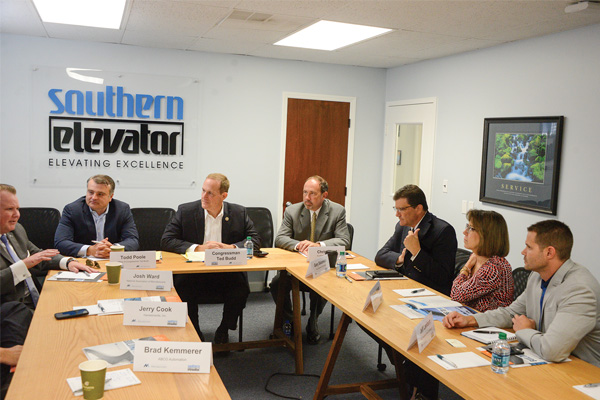13th District Congressman Ted Budd held a business leaders roundtable hosted by the National Association of Manufacturers at Southern Elevator Company in Greensboro on Friday, August 24.
Budd said he was there to listen and then he did, which is surprising behavior for a politician. Budd let the industry representatives have their say, mainly asking questions after his opening remarks.
One point everyone agreed on was that there was a serious labor shortage.
Chris Short, president of Southern Elevator Co., said, “We’ve got more opportunity than we can fill. Our growth is going to slow down because we don’t have the labor.”
He said the current economic environment was the best he had ever seen, but his company can’t grow as fast as they would like because they can’t find enough people to work.
Brad Kemmerer, the president of ABCO Automation, said that people thought his company was taking away jobs, but he said he was keeping companies in business with automation because they can’t find the workers to fill the jobs. He said, because of the backlog of work, companies were paying in advance for their services. He said for companies in the current economy, they needed automation to stay in business because they couldn’t fill the jobs.
And he said he understood that because staffing was what was limiting the growth of his company.
Jerry Cook with governmental affairs for Hanesbrands said they were having big problems with transportation because the interstate highway system was so overcrowded. He said, “We refer to Charlotte, Greensboro and Winston-Salem as hell’s corner.”
Cook said that the trucking companies can’t make any money when their trucks are tied up in traffic for three or four hours and some refused to make certain runs because of the congestion.
He also noted that the state was having to pick up the slack from the federal government on the ports. He said that ships were having to come into port two-thirds loaded because the ports had become too shallow for a fully loaded ship.
Cook said one of the biggest delays in getting transportation improvements was permitting, and if the permitting were streamlined it would make a huge difference. He said sometimes they were dealing with overlapping federal, state and county regulations.
Budd said, “The need for permitting reform is something I’ve actually heard from President Trump.”
Budd noted that the Congressional Review Act – where Congress votes to disapprove of and repeal a regulation – had been used once before 2017, and in 2017 it was used 15 times. He said, “We’re not against regulations. We’re against harmful regulations.”
Budd said that the economic growth started before the tax reform bill was passed but that tax reform had spurred it on. He said, “We don’t want to lose momentum.” He added, “The tone of government is no longer against business or less against business.”
Those at the roundtable talked about education and how the education system didn’t fit the job market. They said that too many students were being encouraged to go to college and get a four-year degree when they would be much better off financially learning a trade.
There were some complaints about the community college system, which was originally designed for people who weren’t getting four-year degrees and, according to this group, spends too much time and effort on being part of the four-year degree program and not enough time and effort training people for jobs.
Cook said that another issue his company had was with electricity and this is in an area that is supposed to have good electricity. He questioned where the state would get the electricity for a large manufacturing facility at one of the megasites if the state were able to land one.
Cook said a number of power plants had been forced to close down but hadn’t been replaced.
The industry representatives had a lot of concerns but they were all related to the booming economy and the problems boiled down to not being able to grow as fast as they could based on the current economy.
If you’ve got to have problems, having problems because of an economy growing too fast to keep up is a pretty good one.

